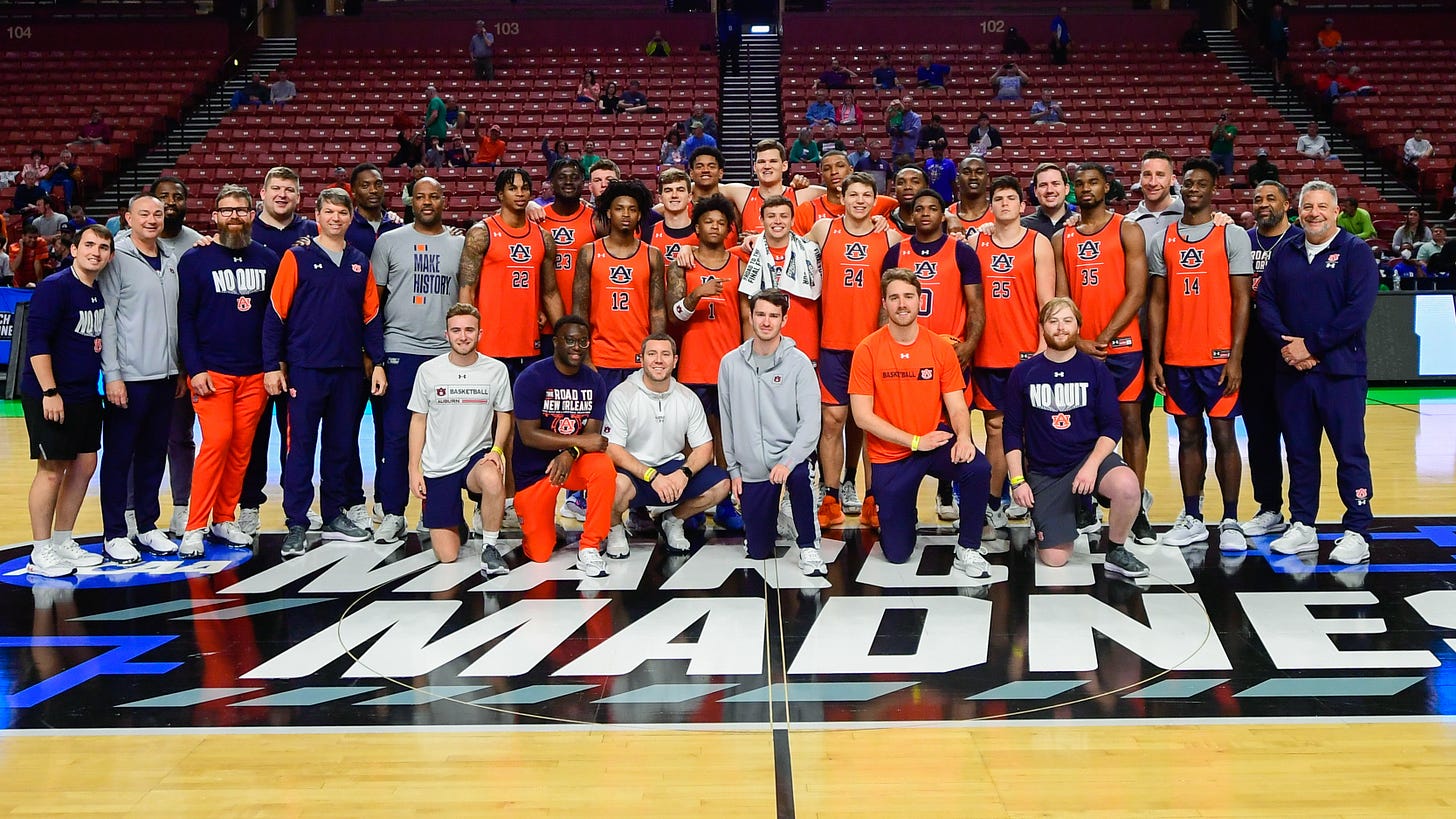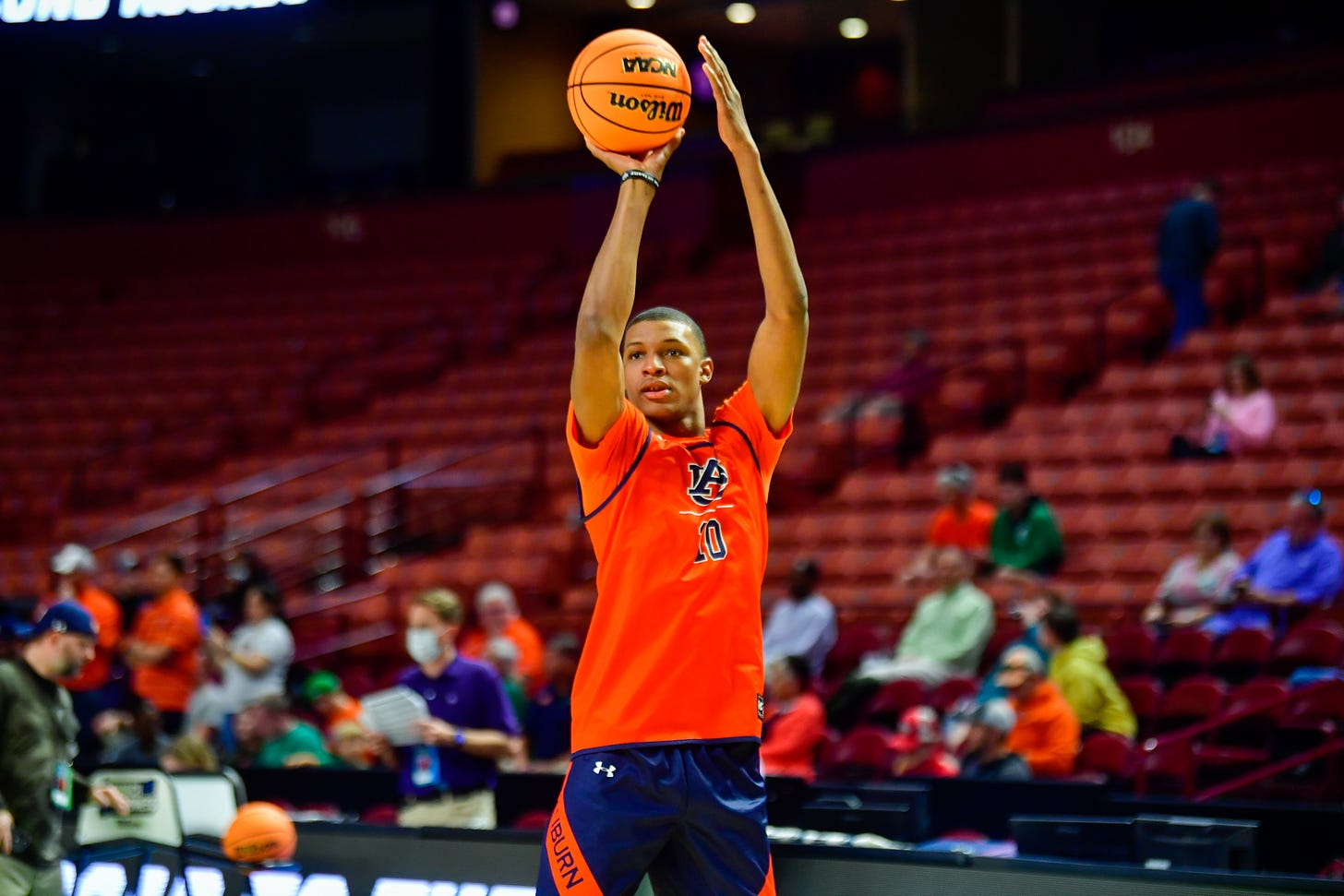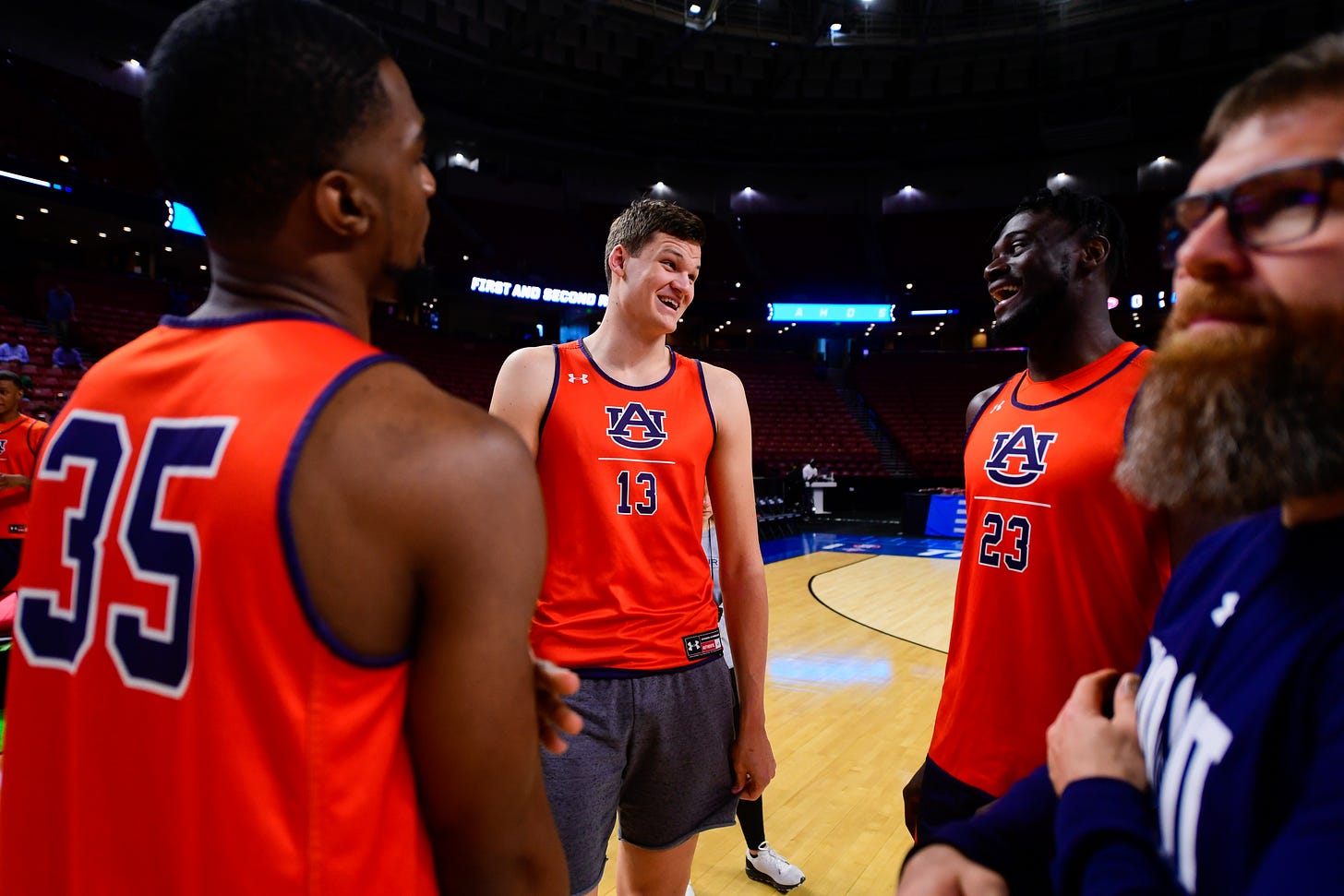"Auburn on three. Family on six."
A potential No. 1 pick, four transfers and several returners came together to play elite basketball quickly. Now they've got to do it on the biggest stage.
This is a free story. We’ll have Observations from the Auburn-Jacksonville State game and a premium recap podcast for all subscribers on Friday evening.
If you aren’t a member of the Inner Circle yet, you can buy a subscription or get a 7-day free trial of The Observer by using the buttons below.
(Matthew Shannon/Auburn Athletics)
Auburn’s open NCAA Tournament practice Thursday in Greenville began like a lot of its on-court work has this season — with dancing.
These Tigers were finally at the Big Dance, and they were staying true to themselves. Players cracked jokes at one another while getting shots up. During a team photo at midcourt, K.D. Johnson tried to swipe the ball away from Wendell Green Jr. while everyone else was looking at the camera.
Then, when the clock was winding down to the final seconds, Bruce Pearl pulled his team in close for a quick speech. The huddle was broken the same way countless ones have been over the last several months:
“Auburn on three. Family on six.”
The team chemistry was on full display for everyone in Bon Secours Wellness Arena to see. And for those who might not know Auburn’s roster that well, it might be a surprise to learn that the bulk of this roster has only been together since the summer — not multiple years.
Auburn’s top six players in minutes this season are four transfers, a true freshman and a junior who missed the first dozen games with an injury. The four transfers are three true sophomores and just one upperclassman.
In terms of experience, only six of the other 67 teams in the NCAA Tournament field are younger than Auburn. In terms of KenPom’s “minutes continuity” — how many minutes are played by the same players from last season — 10 teams have a lower percentage than Auburn’s 33.4%. (The national average is 48.9%.)
It was easy to see that the Tigers were going to be talented. Jabari Smith was the highest-rated signee in program history and a projected NBA lottery pick. Walker Kessler was the second highest-rated roster addition in program history, based on recruiting rankings. They were going to play in the same frontcourt, together.
Auburn addressed its biggest problems from a lackluster season impacted by COVID, a self-imposed postseason ban to help put an old scandal behind it and key injuries. The Tigers needed help in the backcourt, and they landed a trio of guards who wanted either a step up in competition (Green and Zep Jasper) or playing time (Johnson).
Those scholarship players who stayed on the team — Flanigan, Devan Cambridge, Jaylin Williams, Dylan Cardwell, Chris Moore and Stretch Akingbola — would have to adjust to new roles. All of them saw their minutes decrease significantly.
That much change wasn’t going to be easy. Experience matters in college basketball, as Pearl said earlier this week. These Tigers didn’t know how to play with one another.
And yet this overhauled roster, a shining example of what the modern transfer portal era looks like in college basketball, has already accomplished so much heading into its first-round game with No. 15 seed Jacksonville State on Friday.
Auburn is in the NCAA Tournament for only the 11th time. Auburn won its fifth conference championship and its first outright SEC crown since 1999. And this Auburn basketball team reached No. 1 in the country for the first time ever.
The Tigers came in fifth in the preseason SEC poll. They’re in the NCAA Tournament as the fifth-best seed in the entire field.
“This team was picked fifth in the SEC rightly because we had so many new faces,” Pearl said Thursday. “The kids worked really hard in the offseason and in the early season against a challenging schedule to get good quick.”
Auburn isn’t alone in this experiment of proving that elite talent can overcome a lack of experience — Arizona is the fourth-youngest team in the entire country, yet took home a No. 1 seed under a first-year head coach. But there are only a select few teams who have been able to succeed so quickly with so many new faces.
PF Jabari Smith (Matthew Shannon/Auburn Athletics)
The foundation was Smith, who is widely expected to be one of the two biggest candidates for the No. 1 overall pick in the 2022 NBA Draft. (The other is Gonzaga center Chet Holmgren. In a testament to Auburn’s development under Pearl, Smith was the No. 7 recruit in the 247Sports Composite. Holmgren was No. 1.)
A rare 6-foot-10 sharpshooter who brings plenty of value as a rebounder and defender, Smith was a coveted prospect for many schools. He also had an offer to play professionally out of high school with the NBA’s G League program.
“They reached out, but it was just never my dream,” Smith said. “It was never something I just envisioned. I just always had my goal set on college. Playing in March, building relationships, and just going through that college grind, just experiencing that college life. That was always my dream, and that's what I was set on.”
One of the big reasons why Smith chose Auburn over the field? That close-knit nature he saw in Pearl’s program, even when it was about to go through a roster overhaul.
“The family atmosphere — how together everybody is, how together the community is, and just how much the coaches care about their players,” Smith said. “That's been the biggest thing to me. It was always more than basketball since the first day I got here.”
Smith’s decision to sign with Auburn played a big role in landing Kessler, a 7-foot-1 former 5-star who was buried on the depth chart at North Carolina in his freshman season. Kessler and Smith crossed paths in the competitive Georgia high school ranks, and the pitch was for the duo to play together.
But Pearl and his staff couldn’t surround the most talented frontcourt in program history with just anybody.
“When we recruited them, we recruited a certain culture in our locker room, and I promised Jabari or Walker that I'd surround them with great kids, that they would make lifelong friends,” Pearl said. “And they liked each other, and they got close. There's a real advantage to living in a great dorm and being around each other all the time. Then on the court, they went and competed and tried to compete for positions and playing time and roles.
“So we got after each other all summer long and obviously put it together in the fall.”
After the roster was finalized, the summer was filled with a lot of competition and a little relaxation for the Tigers. Pearl just sat back and watched his new-look roster learn how to play with each other on the fly.
They got familiar with Smith’s offensive star power. They saw Kessler’s unleashed defensive potential. They saw Jasper’s relentless on-ball defense, Green’s unlimited confidence and Johnson’s insane competitive streak.
Then there were the times away from the court, where they could have fun and pose for impressive pictures while tubing on nearby Lake Martin. That’s where it all came together.
“I would say it’s how fast we actually ended up bonding,” Flanigan said. “When you bring in a lot of new guys and transfers from a lot of different places, everybody's kind of different. It kind of takes a while for groups to normally click and get in sync.
“But like as soon as we got here, we immediately started hanging out and going places, going bowling and stuff, and just spending time with each other. When we got on the court together, we just synced, and it's been great since.”
C Walker Kessler and C Stretch Akingbola (Matthew Shannon/Auburn Athletics)
Even against a tricky non-conference schedule and a challenging start to SEC play, Auburn went beyond just syncing up on the court. In its first 23 games, the Tigers lost just once — a double-overtime defeat to a vastly more experienced UConn team in just their fourth time playing together.
No team in the modern era of Auburn basketball got off to a better start than this crew of transfers, returning role players and a generational freshman. The Tigers went from a team on the tail end of the Top 25 rankings to the top of the sport.
Auburn had to learn how to be the hunted as quickly as it learned how to hunt together. Those lessons were even tougher, according to Pearl.
“When we were ranked 1 and there was a big target on our heads and we began to look at, ‘Wow, this SEC Championship is really maybe within our reach,’ it began to be the end result,” Pearl said. “‘We've got to win this one. We've got to win this one.’ Then a little less on the process.
“I'm trying to get us focused back to the process right now.”
The Tigers didn’t stay as red-hot all the way through, but they still managed to claim an outright SEC championship with a 15-3 record. They built a résumé strong enough to take home the top No. 2 seed in the NCAA Tournament, even with an early exit in the SEC Tournament.
But it sounds like Pearl is using the creeping outside doubt about Auburn to get this team back to its roots.
“Listen, all I want to be is a 12 seed, OK?” Pearl said. “I'm a 12 seed. That's who I am. That's who I've always been, and that's who my teams have been. That's what Auburn basketball still is. I know we're a 2 seed, and I hope we take advantage of the hard work that we've done to be a 2 seed, but we're hungry, and we're humble. We've got the underdog thing on as well.”
Heading into the NCAA Tournament on Friday, the Tigers are trying to take the lessons from their recent losses away from home and turn them into positives in a “win or go home” situation.
“I think that the biggest thing we've learned is that we're all we've got,” Kessler said. “Our teammates, our coaching staff — we can't rely on anyone else. We've got to come together and do what we do best and just really rely on each other.”
Pearl’s reconstructed roster won’t be that underdog, officially, unless it wins its first two games in the NCAA Tournament and makes it to the Midwest regional in Chicago.
But he knows what his team is capable of doing. He first saw it in the summer, where it became a family in record time. He saw its peaks in the 19-game winning streak and the thrilling highs of clinching an SEC regular-season title that it didn’t have to share.
“From the standpoint of the pieces, we've got the Defensive Player of the Year, in my mind, Walker Kessler, the best shot blocker in the country,” Pearl said. “He cleans up a lot of our messes. I can play-call and get Jabari Smith the shot, and he's going to make it most of the time. We've got undersized but dynamic guards that are capable of getting hot and making plays.
“Put it all together — and especially this year in this league, this was the best the SEC's been since I've been in there, top to bottom — to be able to survive it and stay on top was a great accomplishment.”
There will be time to fully celebrate the accomplishments of this special team, though.
“That's the regular season,” Pearl said. “This is the postseason. It's one-and-done right now.”






